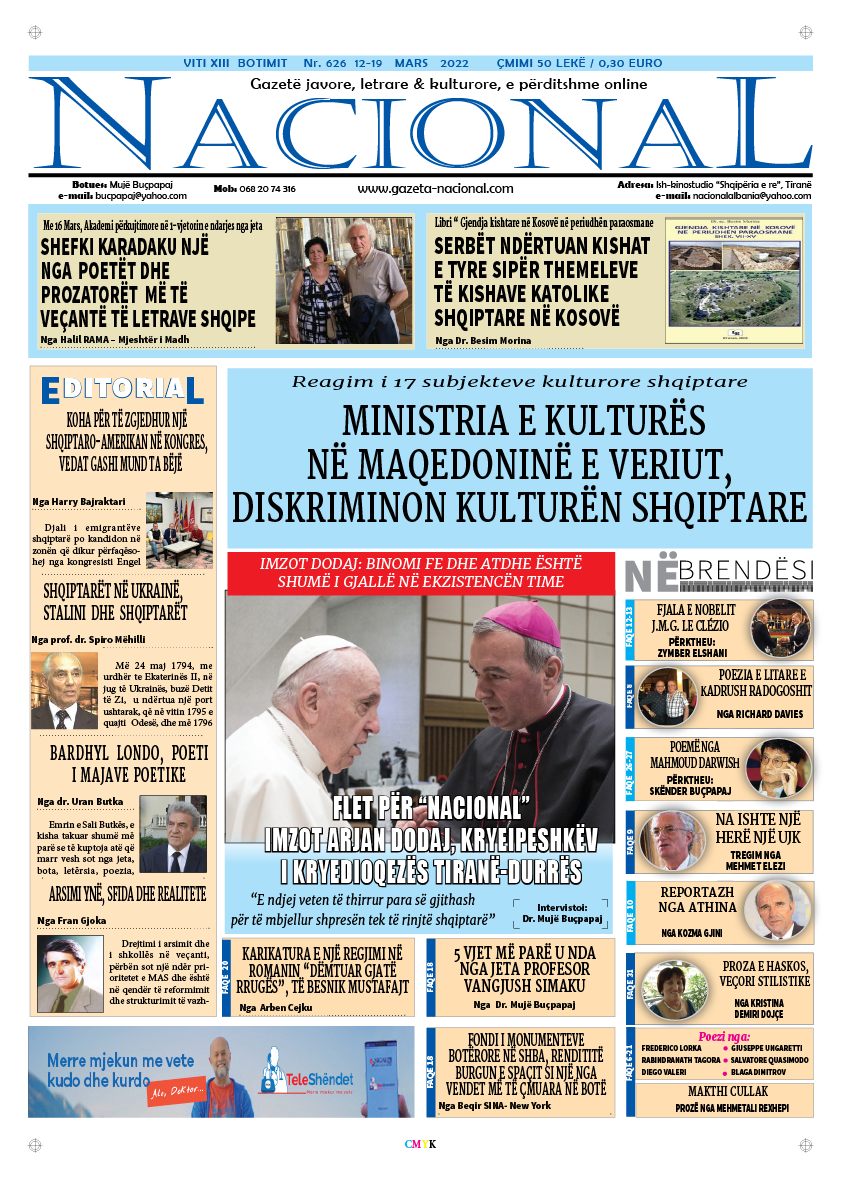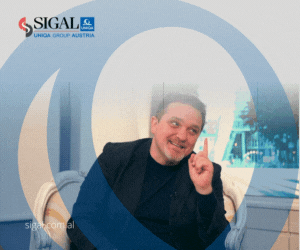Ish-sekretari amerikan i shtetit Mike Pompeo do të jetë nesër në Shqipëri për të marrë titullin e nderit “Doctor Honoris Causa”.
Ceremonia do te mbahet nesër tek ish-Sheratoni, ndërsa do të jetë UT që do t’i jap titullin.
Kjo është vizita e parë e Mike Pompeo në vendin tonë. Ai ka qenë sekretar i Shtetit Amerikan gjatë kohës kur presidenti i SHBA ishte Donald Trump
\
Mike Pompeo
From Wikipedia, the free encyclopedia
Michael Richard Pompeo (/pɒmˈpeɪoʊ/; born December 30, 1963) is an American politician, diplomat, and businessman who served under President Donald Trump as director of the Central Intelligence Agency (CIA) from 2017 to 2018 and as the 70th United States secretary of state from 2018 to 2021.
Pompeo is a former United States Army officer. He was a member of the United States House of Representatives from 2011 to 2017, representing Kansas’s 4th congressional district. He was a Kansas representative on the Republican National Committee. Pompeo is also a member of the Tea Party movement within the Republican Party.[2]
Once a critic of Donald Trump, whom he called an “authoritarian”, Pompeo became one of his biggest supporters after Trump became the Republican nominee in the 2016 presidential election.[3][4] President Donald Trump appointed Pompeo director of the Central Intelligence Agency in January 2017. Trump promoted Pompeo to secretary of state in March 2018, with Pompeo succeeding Rex Tillerson after his dismissal.[5] Pompeo was confirmed by the Senate on April 26, 2018, in a 57–42 vote[6][7][8] and was sworn in the same day.[9]
During his tenure as secretary of state, Pompeo was described as among the staunchest Trump loyalists in the Cabinet.[4] During his tenure, he routinely flouted norms and protocols followed by his predecessors.[4] These included using his office to campaign for Trump’s re-election officials, firing and criticizing State Department inspectors general, and standing on the sidelines while Trump and his allies harassed career diplomats.[4] A State Department Inspector General report found more than 100 instances of misconduct where Pompeo requested that State Department staff perform personal errands for him and his wife.[10] Under Pompeo’s tenure, career State Department officials quit, were forced into retirement or fired, and were replaced by inexperienced political appointees.[11]
Early life and education
Pompeo was born in Orange, California, the son of Dorothy (born Mercer) and Wayne Pompeo.[12][13] His paternal great-grandparents, Carlo Pompeo and Adelina Tollis were born in Pacentro, Abruzzo, Italy, and emigrated to the United States in 1899 and 1900, respectively.[14] In 1982, Pompeo graduated from Los Amigos High School in Fountain Valley, California, where he played forward on the basketball team.[15] In 1986, Pompeo graduated first in his class from the United States Military Academy at West Point, where he majored in engineering management.[12][16][17] He was a classmate of Brian Bulatao and Ulrich Brechbuhl, who later helped him found Thayer Aerospace.[18]
From 1986 to 1991, Pompeo served in the U.S. Army as an armor officer with the West Germany-based 2nd Squadron, 7th Cavalry in the 4th Infantry Division. He served as a tank platoon leader before becoming a cavalry troop executive officer and then the squadron maintenance officer.[19] Pompeo left the U.S. Army at the rank of captain.[1][20][21][22]
In 1994, Pompeo earned a Juris Doctor from Harvard Law School, where he was an editor of the Harvard Law Review and the Harvard Journal of Law & Public Policy.[23][24][25]
Early career
After graduating from law school, he worked as a lawyer for Williams & Connolly in Washington.[26]
In 1998, Pompeo moved to Wichita, Kansas, where he and three other West Point friends, Brian Bulatao, Ulrich Brechbuhl, and Michael Stradinger, acquired three aircraft-part manufacturers there (Aero Machine, Precision Profiling, B&B Machine) and in St. Louis (Advance Tool & Die), renaming the entity Thayer Aerospace after West Point superintendent Sylvanus Thayer.[27][28][29] Venture funding for the private organization included a nearly 20% investment from Koch Industries[3] as well as Dallas-based Cardinal Investment, and Bain & Company (Brechbuhl worked for Bain at the time).[30][27] Brechbuhl and Stradinger left the company shortly after it was founded, but Pompeo and Bulatao continued.
In 2006, he sold his interest in the company, which by then had been renamed Nex-Tech Aerospace, to Highland Capital Management, which had clients including Lockheed Martin, Gulfstream Aerospace, Cessna Aircraft, Boeing, Spirit AeroSystems and Raytheon Aircraft.[31] Pompeo then became president of Sentry International, an oilfield equipment manufacturer that was also a partner of Koch Industries.[32]
In 2017, when Pompeo became head of the CIA, he named his former business partner, Brian Bulatao, the agency’s chief operating officer.[28]
U.S. House of Representatives (2011–2017)
Elections
Pompeo represented Kansas’s 4th congressional district from 2011 until his January 2017 appointment to director of the Central Intelligence Agency (CIA).[33]
In the 2010 election, Pompeo won the Republican primary for Kansas’s 4th District congressional seat with 39% of the vote,[34] defeating state senator Jean Schodorf (who received 24%) and two other candidates.[35][36] Late in the primary, Schodorf began to surge in the polls, prompting two outside groups—Common Sense Issues and Americans for Prosperity—to spend tens of thousands of dollars in the campaign’s final days to attack Schodorf and support Pompeo.[37] In the general election, Pompeo defeated Democratic nominee Raj Goyle, a member of the Kansas House of Representatives. Pompeo received 59% of the vote (117,171 votes) to 36% for Goyle (71,866).[38] During Pompeo’s campaign, its affiliated Twitter account praised as a “good read” a news article that called Goyle, his Indian-American opponent, a “turban topper” who “could be a muslim, a hindu, a buddhist etc. who knows”. Pompeo later apologized to Goyle for the tweet.[39] Pompeo received $80,000 in donations during the campaign from Koch Industries and its employees.[40]
In the 2012 election, Pompeo defeated Democratic nominee Robert Tillman by a margin of 62–32%.[41] Koch Industries gave Pompeo’s campaign $110,000.[42]
In the 2014 election, Pompeo won the general election with 67% of the vote, defeating Democrat Perry Schuckman.[43]
In the 2016 election, Pompeo beat Democrat Daniel B. Giroux in the general election with 61% of the vote.[44]
Tenure
Pompeo served on the United States House Permanent Select Committee on Intelligence, the United States House Committee on Energy and Commerce, the United States House Energy Subcommittee on Digital Commerce and Consumer Protection, the United States House Energy Subcommittee on Energy, the United States House Intelligence Subcommittee on the CIA, and the United States House Select Committee on Benghazi.[45]
Pompeo was a member of the Congressional Constitution Caucus.[46]
Pompeo was original sponsor of the Safe and Accurate Food Labeling Act of 2015.[47]
CIA Director (2017–2018)
On November 18, 2016, President-elect Donald Trump announced that he would nominate Pompeo to be the director of the Central Intelligence Agency.[48] He was confirmed by the Senate on January 23, 2017, with a vote of 66–32, and sworn in later that day.[49][50] In his confirmation he failed to disclose the links between his company in Kansas and a Chinese government owned firm.[51]
In February 2017, Pompeo traveled to Turkey and Saudi Arabia. He met with Turkish president Recep Tayyip Erdoğan to discuss policy on Syria and ISIL.[52] Pompeo honored the then-crown prince of Saudi Arabia Muhammad bin Nayef with the CIA’s “George Tenet” Medal.[53] It was the first reaffirmation of Saudi Arabia–United States relations since Trump took office in January 2017.[54] In March 2017, Pompeo formally invoked state secrets privilege to prevent CIA officers, including Gina Haspel and James Cotsana, from being compelled to testify in the trial of Bruce Jessen and James Elmer Mitchell.[55]
In June 2017, Pompeo named Michael D’Andrea head of the CIA’s Iran mission center.[56]
In August 2017, Pompeo took direct command of the Counterintelligence Mission Center, the department which helped to launch an investigation into possible links between Trump associates and Russian officials.[57] Former CIA officials, including John Sipher, expressed concern given Pompeo’s proximity to the White House and Donald Trump.[58]
In September 2017, Pompeo sought authority for the CIA to make covert drone strikes without the Pentagon’s involvement, including inside Afghanistan.[59]
During Easter weekend 2018, Pompeo visited North Korea and met with Supreme Leader Kim Jong-un to discuss the upcoming 2018 North Korea–United States summit between Kim and Trump.[60]
Pompeo usually personally delivered the president’s daily brief in the Oval Office.[61] At Trump’s request, Pompeo met with former NSA official William E. Binney to discuss his doubts of Russian interference in the 2016 United States elections.[62]
At the suggestion of Tony Perkins, president of the Family Research Council, Pompeo planned to hire chaplains at the CIA.[62]
U.S. Secretary of State (2018–2021)
Nomination and confirmation
President Trump announced on March 13, 2018, that he would nominate Pompeo to serve as secretary of state, succeeding Rex Tillerson, who stepped down on March 31, 2018.
On April 23, the Senate Foreign Relations Committee voted 11–9 in favor of sending Pompeo’s nomination to the full Senate, with Senator Chris Coons voting “present” and Johnny Isakson, who was absent that day, voting “yes by proxy”.[63] In the interest of saving the committee’s time, Coons decided to vote “present”, as the vote would have been tied if he had voted no on the nomination with Isakson absent, a situation that would have nullified his vote.[64] The Senate floor vote took place on April 26 and Pompeo was confirmed by the full Senate by a 57–42 vote, with five of ten Democratic senators running for reelection in 2018 in states that Trump won in 2016, voting to confirm Pompeo.[65][7][66]
Pompeo was sworn in on April 26, 2018.[67] In testimony before the senate, he promised to prioritize improving the low-morale issue at the State Department.[67]
Confirmation process
Voting body Vote date Vote results
Senate Committee on Foreign Relations April 12, 2018 11–9
Full Senate April 23, 2018 57–42
Tenure
Pompeo with Kim Jong-un
During his tenure as Secretary of State, Pompeo was described as among the staunchest Trump loyalists in the Cabinet.[4] During his tenure, he routinely flouted norms and protocols followed by his predecessors.[4] These included using his office to campaign for Trump’s re-election officials, firing and criticizing State Department inspectors general, and standing on the sidelines while Trump and his allies harassed career diplomats.[4] Under Pompeo’s tenure, career State Department officials quit, were forced into retirement or fired, and were replaced by inexperienced political appointees.[11] Like Trump, Pompeo praised dictators and criticized the U.S.’s traditional democratic allies.[4][11] International relations scholars Daniel Drezner, Richard Sokolsky, and Aaron David Miller described Pompeo as the worst secretary of state in American history, citing numerous foreign policy failures, fealty to Trump at the cost of U.S. national interest, and improprieties in office.[68][69]
Pompeo played a role in Trump’s three summits with North Korean supreme leader Kim Jong-un. The summits failed to achieve any reduction in North Korea’s nuclear arsenal.[70][71] In a 2021 interview with a conservative podcast, Pompeo said that “I regret that we didn’t make more progress” on North Korea.[70]
In August 2018, Pompeo thanked Crown Prince Mohammad bin Salman “for Saudi Arabia’s support for northeast Syria’s urgent stabilization needs”.[72] Pompeo and Crown Prince also discussed the situation in war-torn Yemen.[73]
Pompeo condemned the military crackdown by the Myanmar Army and police on Rohingya Muslims.[74] In July 2018, Pompeo raised the issue of Xinjiang internment camps and human rights abuses against the Uyghur Muslim minority in China.[75] Pompeo criticized Iran’s supreme leader Ayatollah Ali Khamenei for his refusal to condemn the Chinese government’s repressions against the Uyghurs.[76]
On October 10, 2018, Pompeo said Israel “is everything we want the entire Middle East to look like going forward” and that the Israel–United States relations are “stronger than ever”.[77] In March 2019, when questioned regarding Israel’s conflicts with Iran and following a visit to the Western Wall with Israeli prime minister Benjamin Netanyahu, Pompeo spoke to “the work that our administration’s done to make sure that this democracy in the Middle East, that this Jewish state, remains … I am confident that the Lord is at work here.”[78]
On November 16, 2018, a CIA assessment was leaked to the media[79] that concluded with “high confidence” Saudi Arabia’s crown prince Mohammad bin Salman ordered the October 2, 2018, assassination of Washington Post columnist Jamal Khashoggi. Under mounting pressure from lawmakers who wanted action against Saudi Arabia, Pompeo disputed the CIA’s conclusion and declared there was no direct evidence linking the Crown Prince to the Khashoggi’s assassination.[80]
On January 7, 2019, Pompeo began a diplomatic tour of the Middle East to assure regional U.S. partners that, amid the sudden withdrawal of U.S. troops from Syria, the U.S. mission to degrade and destroy the Islamic State and to counter Iranian influence in the region had not changed. The trip included stops in Jordan, Iraq, Egypt, and the Gulf nations.[81]
Pompeo announced on January 23, 2019, that Juan Guaidó would be recognized by the U.S. as the legitimate interim president of Venezuela, and that American diplomats in Caracas would remain at their posts, even as Nicolás Maduro gave them three days to evacuate the country upon Guaidó assumption of the presidency.[82] After protests for over “homophobic, racist and misogynist remarks” by Brazilian president Jair Bolsonaro, a ceremony hosted by the Brazilian-American Chamber of Commerce (originally set to honor Pompeo and Bolsonaro) was canceled.[83]
On May 14, 2019, Pompeo met for three hours with Russian Foreign Minister Lavrov and for ninety minutes with Russian President Putin in Sochi, Russia. According to a Kremlin aide, they discussed Syria, North Korea, Iran, Venezuela, and the New Strategic Arms Reduction Treaty (New START); Pompeo said he brought up—and Putin again denied—Russian election interference.[84]
In October 2019, the State Department web site promoted a speech by Pompeo “On Being a Christian Leader”, which he delivered to a Christian group in his official government role. Pompeo touts Christianity in his speech, describes how he applies his faith to his government work. The promotion of the speech by the State Department was met with criticism from those who believed it was incompatible with separation of church and state.[85][86][87] He also created the Commission on Unalienable Rights, and created a faith-based employee affinity group that includes contractors.[88]
Pompeo defended the 2019 Turkish offensive into north-eastern Syria, saying Turkey has a “legitimate security concern” with “a terrorist threat to their south”. However, Pompeo denied that the United States had given a “green light” for Turkey to attack the Kurds.[89]
In November 2019, Pompeo said the U.S. no longer views Israeli settlements in the occupied West Bank as a violation of international law, breaking with decades of U.S. policy.[90]
In rejecting a claimed double standard in recognizing Israel’s annexation of the Golan Heights but placing sanctions on Russia for annexing Crimea in 2014, Pompeo said “What the President did with the Golan Heights is recognize the reality on the ground and the security situation necessary for the protection of the Israeli state.”[91]
In January 2020, the Trump administration assassinated Iranian General Qasem Soleimani. Pompeo was reportedly among the most hawkish advisors within the administration during the meeting in which Trump decided to assassinate Soleimani.[92] On the day of the strike, Pompeo asserted the attack was ordered by Trump to disrupt an “imminent attack” by Soleimani operatives, although subsequent reports on that rationale were mixed.[93][94][95][96]
In January 2020, Pompeo abruptly ended an interview with Mary Louise Kelly of NPR’s All Things Considered, and called her to private quarters where he admonished her for asking questions regarding Ukraine during the interview.[97]
On Pompeo’s recommendation, Trump fired the State Department Inspector General, Steve Linick in May 2020.[98] Linick had recently begun a watchdog investigation into Pompeo’s alleged abuse of using a political appointee to perform tasks for him and his wife.[99][100] The IG also investigated Pompeo’s role in the Trump administration’s decision to declare an “emergency” to bypass a congressional freeze on arms sales to Saudi Arabia and the UAE. Prior to his firing, Linick had requested an interview with Pompeo, which Pompeo had declined.[101] After Linick’s firing, it was also revealed that he had found that a top Pompeo aide had likely failed to report allegations of workplace violence.[102] Pompeo denied that he sought to fire Linick in retaliation.[98]
Pompeo with Sudanese Prime Minister Abdalla Hamdok, in Khartoum, Sudan, on August 25, 2020
From the time he took office as Secretary of State in April 2018 until spring 2020, Pompeo had hosted about two dozen taxpayer-funded “Madison dinners” at the Diplomatic Reception Rooms in the State Department’s headquarters) for hundreds of elite attendees.[103][104] More than half of the invitees to these events were from the corporate world, politics or government. Every invited congressional member was a Republican. Only 14% of the invitees were diplomats or foreign officials, which raised questions as to whether the dinners served any foreign policy purpose.[103] State Department officials and others raised concerns that the dinners were intended for Pompeo to cultivate supporters and donors for future political ambitions, especially since detailed contact information for each attendee was sent to Pompeo’s wife’s personal email address.[103][104] Pompeo temporarily suspended the “Madison dinners” when the COVID-19 pandemic hit the U.S., but resumed the dinners at the Blair House in September 2020, despite the controversy over them and concerns about public health.[104]
Pompeo praised Trump-brokered peace agreement between Israel and the United Arab Emirates as an “enormous” step forward on the “right path”.[105] On August 27, 2020, Pompeo, after visiting Omani Sultan Haitham bin Tarik Al-Said, concluded a Middle East trip aimed at encouraging Arab countries to follow the UAE’s move. According to Hugh Lovatt of the European Council on Foreign Relations, “… the lack of any additional public commitments during Secretary Pompeo’s regional tour looks like an anti-climax [and] it is possible that a lack of clarity on the U.S. commitment to deliver F-35s to the UAE could have also played a part in slowing a second wave of normalisation.”[106]

















